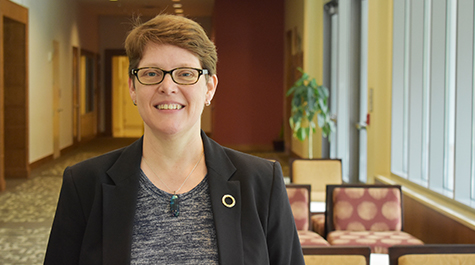Noelle St. Germain-Sehr joins W&M Counseling faculty
This fall, the School of Education welcomes four new faculty members. Today, we introduce Noelle St. Germain-Sehr, who is joining our Counseling faculty.
Tell us a little about your background and what brought you to W&M.
I worked as a counselor educator for 16 years (and was a director of clinical training for the last eight years) when I was laid off due to Argosy University’s closure in December of 2018. I took that opportunity to really think about what I wanted to do and where I wanted to be. I looked to my values as a guide and it led me to knowing several things firmly: (1) I wanted to be where I could be of the most benefit to others; (2) I wanted to be somewhere with a firmly-established and high-quality CACREP-accredited on-ground counseling program that had an online counseling program (so I could remain in Texas until my children finished school); (3) I wanted to work in a small liberal arts university and a program that was student-focused; (4) I wanted to be somewhere with a strong social justice focus and an active role in benefiting society; and (5) I wanted to be somewhere I could pursue my research interests in transpersonal counseling, LGBTQ+ issues, counselor development and supervision and other areas. When I heard about the counseling clinical experience director position at William & Mary, it seemed like it was written for me based on my previous career experience, and the university mission and values seemed like a perfect fit with my worldview and values.
What’s your area of research and what question are you most passionate about answering right now?
I have several areas of interest for research, but much of my research has been focused in two areas: transpersonal approaches to counseling and LGBTQ+ issues. I am currently involved in research related to transpersonal approaches to counseling, which include phenomena such as after-death communication, near-death experiences, and other spiritually-transformative experiences. If I had to pick one question that I am most passionate about answering right now, it is this: How can we integrate the healing capacities of spiritually-transformative experiences into the counseling process? I am particularly interested in de-pathologizing spiritually-transformative experiences within the mental health community, educating mental health professionals about transpersonal experiences, and helping mental health professionals understand how to help clients integrate these experiences in a way that is growth-promoting and healing.
You’ll be working with our online counseling students, especially supporting them as they pursue field experiences. What do you enjoy most about working with this population of students?
In my experience, students who choose an online counseling program typically do so because they are non-traditional students who are unable to attend a master’s program in a traditionally-constructed on-ground program. As such, they often have broad life experience that they can apply to their learning. I also find them to be able to synthesize and apply what they are learning in complex and sophisticated ways based on their previous work experiences.
How else do you hope to get involved with the School of Education community?
I hope to be on campus several times a year and to engage with major events going on in the School of Education and larger William & Mary community. I would like to collaborate on research with my colleagues and students, develop continuing education opportunities (including certificate programs) online for working professionals that could be a source of revenue for the school, and develop ways to use workshops, online training, and research as avenues for social justice advocacy within local, national, and international communities.
Anything else you’d like to share?
I have a long-term goal to develop a center for transpersonal research and practice that would serve several purposes: (1) extend and innovate research into transpersonal approaches to counseling practice, (2) provide counseling services that are inclusive of transpersonal interventions and that can assist clients in integrating spiritually-transformative experiences, and (3) provide educational services and training to professionals and the community to normalize transpersonal phenomena and improve clinicians’ and other medical providers’ ability to respond to clients’ reports of transpersonal phenomena.
